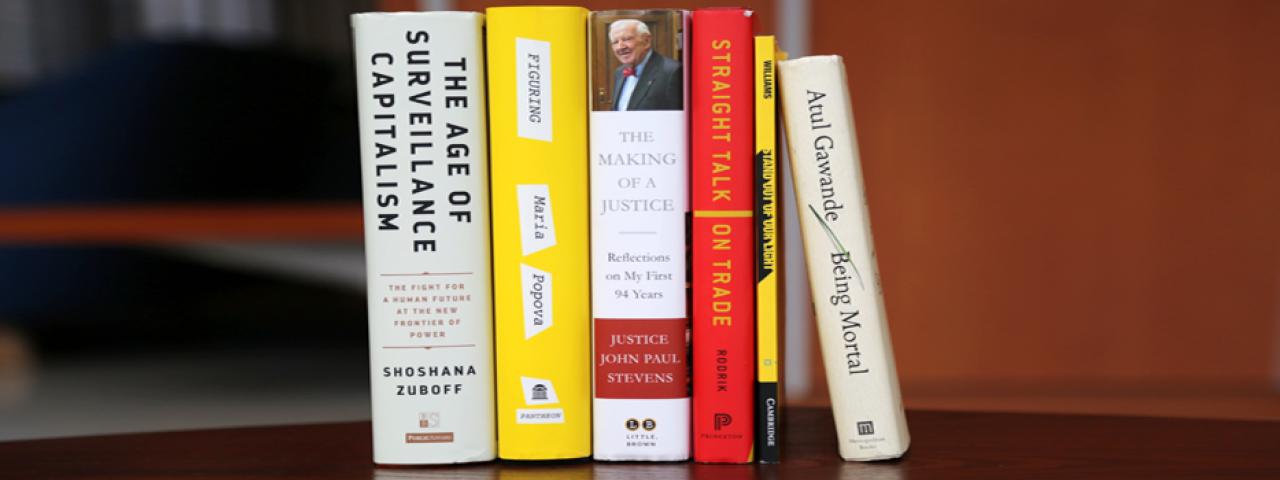
At commencement, Vice Chancellor Jeffrey Lehman told graduates to keep up those habits that nourish creativity, including “reading tons of books, at least six each year, regardless of whether they are fiction or nonfiction, biography or fantasy.” Here, Lehman shares six books that shaped his thinking and understanding of the world in 2019:
1. Being Mortal (2014)
Atul Gawande
An eminent brain surgeon, Atul Gawande argues that changes in medical technology and social structures require us to rethink how medical professionals, friends, and family interact with people nearing the end of life. Gawande invites us to reflect on how to become “the authors of our own lives,” to exercise our autonomy in ways that help other living beings and that serve a larger cause than just our friends and family.
2. Stand Out of Our Light (2018)
James Williams
After working for ten years on search advertising at Google, James Williams left the industry to pursue a doctorate at Oxford, studying the intersection of philosophy, ethics, and technology. In this book, he argues that “information” is no longer scarce, but “attention” is. Media today leaves us too distracted to consider what we want to do at any given moment, what kind of people we want to be over time, and what goals and values we wish to advance. He argues in favor of a new ethics of advertising and design that can help restore a meaningful “freedom of attention.”
3. Straight Talk on Trade (2018)
Dani Rodrik
Distinguished economist, Dani Rodrik presents a powerful alternative to the widespread belief that, although free trade inevitably leaves some people worse off, it is invariably better for humanity as a whole. This view, which Rodrik calls “hyperglobalization,” under-appreciates the value to humanity of having very different nation-states serving their citizens in very different ways. He argues for a system of global governance that respects the primacy of nation-states, facilitates fair trade among them, and uses a light touch to nurture the kind of global consciousness we need to address today’s truly transnational challenges.
4. The Age of Surveillance Capitalism (2019)
Shoshana Zuboff
Shoshana Zuboff is a social psychologist, one of the foremost scholars of the digital revolution. In this book, she explores how competitive markets have created a world in which businesses are rewarded for gathering more and more detailed information about each of us, developing sophisticated ways of predicting our behavior, and creating ever more powerful mechanisms to modify our behavior without our noticing. The result is a frighteningly dangerous world, where our freedom is imperiled not by public power, but by the power of concentrated, technologically enabled, private enterprises.
5. Figuring (2019)
Maria Popova
Maria Popova is renowned for her distinctive and provocative blog, Brain Pickings. This book considers what it means to attain “completeness of being” by exploring the complex and overlapping personal and professional lives of astronomer Maria Mitchell, journalist Margaret Fuller, sculptor Harriet Hosmer, poet Emily Dickinson, and naturalist Rachel Carson. Popova considers the significance of love, loss, creativity, and how people can, during their brief lives, find a way to meaningfully “belong to the world.”
6. The Makingof a Justice (2019)
John Paul Stevens
I served as a law clerk to Justice Stevens during the eighth year of his thirty-five year tenure as a Justice on the U.S. Supreme Court. This book of his memoirs was published just two months before he passed away this summer, at the age of 99. The book is of special interest to lawyers and legal scholars, but I believe any educated person would benefit from reading the first hundred pages. They offer a fine sense of what an exceptional and inspiring man Justice Stevens was – brilliant, humble, generous, gentle, and funny.

